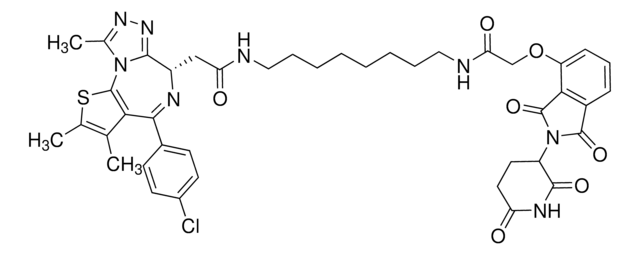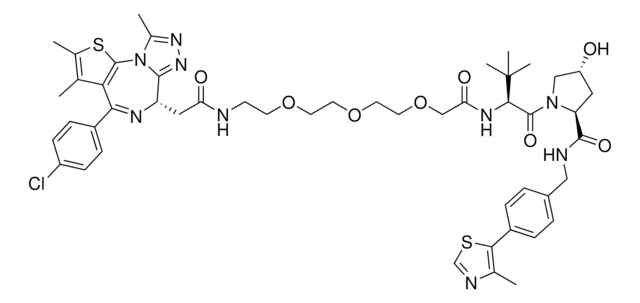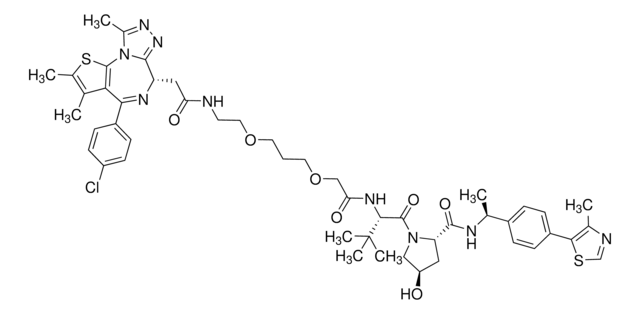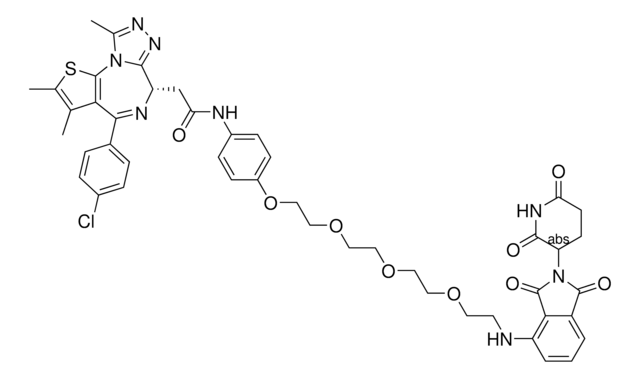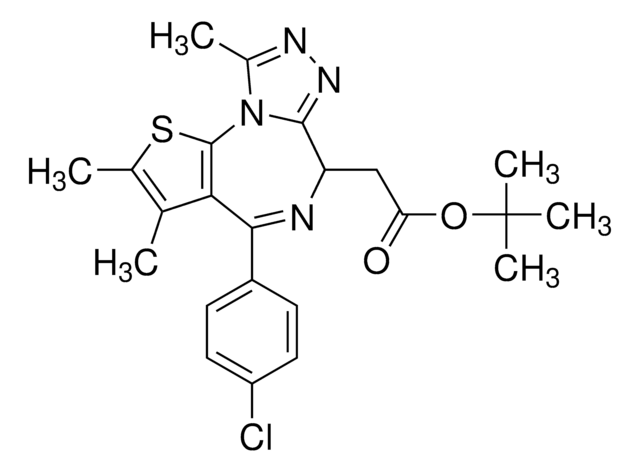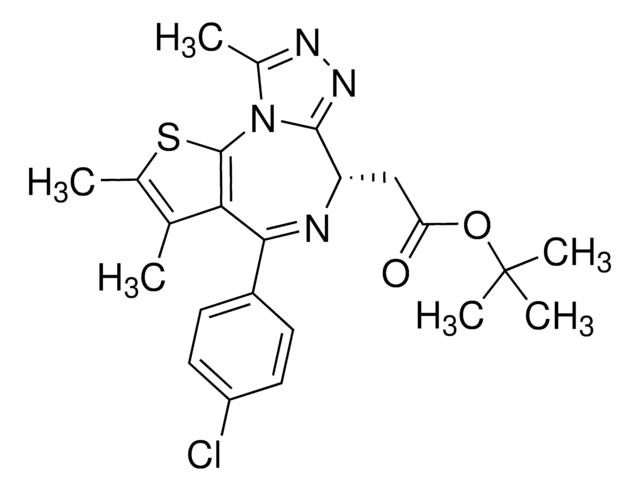SML2687
dBET1
≥98% (HPLC)
동의어(들):
(6S)-4-(4-Chlorophenyl)-N-[4-[[2-[[2-(2,6-dioxo-3-piperidinyl)-2,3-dihydro-1,3-dioxo-1H-isoindol-4-yl]oxy]acetyl]amino]butyl]-2,3,9-trimethyl-6H-thieno[3,2-f][1,2,4]triazolo[4,3-a][1,4]diazepine-6-acetamide, 2-((S)-4-(4-Chlorophenyl)-2,3,9-trimethyl-6H-thieno[3,2-f][1,2,4]triazolo[4,3-a][1,4]diazepin-6-yl)-N-(4-(2-(2-(2,6-dioxopiperidin-3-yl)-1,3-dioxoisoindolin-4-yloxy)acetamido)butyl)acetamide
로그인조직 및 계약 가격 보기
모든 사진(1)
About This Item
실험식(Hill 표기법):
C38H37ClN8O7S
CAS Number:
Molecular Weight:
785.27
MDL number:
UNSPSC 코드:
12352200
NACRES:
NA.77
추천 제품
ligand
thalidomide
분석
≥98% (HPLC)
양식
powder
색상
white to beige
solubility
DMSO: 2 mg/mL, clear
저장 온도
−20°C
생화학적/생리학적 작용
dBET1 is a JQ1-and-phthalimide conjugate that causes the degradation of BRD4 protein, a transcriptional coactivator that regulates the expression of genes that promote cancer cell proliferation and survival. JQ1 is a selective BET bromodomain (BRD) inihbitor. The phthalimide portion is a derivative of the drug thalidomide, which is known to bind to cereblon (CRBN), part of an ubiquitin E3 ligase complex resulting in ubiquitylation and degradation by the proteasome. The conjugate dBET1 induced highly selective cereblon-dependent BET protein degradation both in vitro and in vivo. It induced complete CRBN-dependent proteosomal degradation of BRD4 in a human acute myeloid leukaemia (AML) cell line and delayed leukemia progression in mice.
관련 제품
제품 번호
설명
가격
Storage Class Code
11 - Combustible Solids
WGK
WGK 3
Flash Point (°F)
Not applicable
Flash Point (°C)
Not applicable
가장 최신 버전 중 하나를 선택하세요:
Afua A Akuffo et al.
The Journal of biological chemistry, 293(16), 6187-6200 (2018-02-17)
Upon binding to thalidomide and other immunomodulatory drugs, the E3 ligase substrate receptor cereblon (CRBN) promotes proteosomal destruction by engaging the DDB1-CUL4A-Roc1-RBX1 E3 ubiquitin ligase in human cells but not in mouse cells, suggesting that sequence variations in CRBN may
Georg E Winter et al.
Science (New York, N.Y.), 348(6241), 1376-1381 (2015-05-23)
The development of effective pharmacological inhibitors of multidomain scaffold proteins, notably transcription factors, is a particularly challenging problem. In part, this is because many small-molecule antagonists disrupt the activity of only one domain in the target protein. We devised a
Kelly M DeMars et al.
Neurochemistry international, 127, 94-102 (2019-03-16)
Neuroinflammation after stroke significantly contributes to neuronal cell death. Bromodomain and Extra Terminal Domain (BET) proteins are essential to inflammatory gene transcription. BET proteins (BRD2, BRD3, BRD4, and BRDT) have varied effects including chromatin remodeling, histone acetyltransferase activity, and as
자사의 과학자팀은 생명 과학, 재료 과학, 화학 합성, 크로마토그래피, 분석 및 기타 많은 영역을 포함한 모든 과학 분야에 경험이 있습니다..
고객지원팀으로 연락바랍니다.